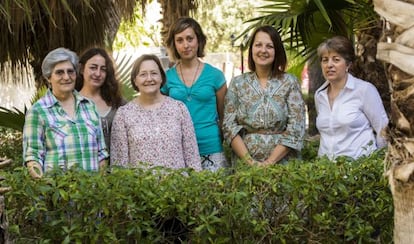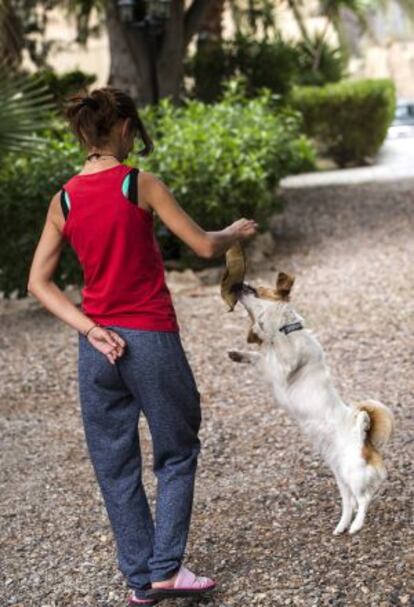The Spanish nuns helping prostitutes start a new life
A group of sisters has been working to rescue women from the sex trade in Almería


Each week a group of Spanish nuns sets off in a mobile home, traveling the highways and byways of Almería to visit the Mediterranean province’s prostitutes. They find them in brothels located alongside major roads and working out of apartments, while others are hidden away in cortijos, squalid farm buildings situated among the vast swathes of plastic-sheeted greenhouses where much of Spain’s vegetable produce is grown.
One of the Nigerians told me that she had been there for seven years, and had never been out”
The nuns do not belong to any specific order, wear habits, or live in nunneries, but they do occasionally produce miracles. They serve coffee and hand out condoms from the back of their van, as well as offering advice and sanctuary, and over the years have helped dozens of women forced into prostitution by international gangs, or simply economic desperation. At the end of each outing, the nuns sometimes return with women to a shelter they run, the address of which is confidential. In fact, the nuns only agree to talk to EL PAÍS on condition that neither the location of the shelter nor the identity of the women are revealed.
“I was tricked by a Gypsy man,” says Erika, a 24-year-old from Romania. She was aged 12 at the time; he was 27. “He told me we would come to Spain, that I could work as a cleaner…” At 14, she became pregnant. “So he sold me to another Romanian Gypsy.” Erika says she doesn’t know how much she was sold for, only that her new owner was unaware she was pregnant. When he found out, he beat her repeatedly, hoping she would lose her baby. But she and the baby survived, and she went back to Romania to give birth. “The same day, he came to the hospital and told me that I was his property. He put me out to work immediately. My father’s wife took care of the baby.” Back in Spain, her pimp forced her to give him €300 a day. “If I didn’t, he would beat me,” she says, describing how he would force her head into a fridge and slam the door over and over again. On one occasion, she says, he slashed her thighs and then forced her to have sex with him: “A customer told me to go to the police.” The case is now awaiting trial, and Erika no longer lives in the shelter.
María José Palomino, one of the nuns who helped Erika start a new life, says she remembers the day she met the young Romanian woman and how shocked she was by her condition: “It was the way her body rejected any contact, the result of all those degrading things that had been done to her.”

After Italy, Spain has the European Union’s highest rate of sexual exploitation. Since January of this year alone, the police have arrested 264 people as part of 76 operations against the gangs that traffic women, identifying “more than 4,900 potential victims.” Among them, 117 were helped by NGOs and charities – 14 of them minors – while 66 were placed in witness protection programs. Between April 2013 and December 2014, police arrested 1,450 people, identified 11,751 potential victims, arranged protection for 774, and seized more than €29 million. Spain’s Interior Ministry estimates the country’s prostitution business to be worth more than €5 million a day.
Over the course of their travels, the nuns have learned to spot makeshift brothels in the most unlikely spots. “I was shocked when I first visited the farms outside Roquetas [a small coastal town about 10 kilometers from the port city of Almeria]. I had never imagined that prostitution could take place somewhere like that,” Palomino says describing the cortijos, where women work out of tumbledown farm buildings with corrugated iron roofs, the dirt floors hidden by a few blankets, and filthy, bug-infested beds, with a plastic chair placed outside the door to indicate that the place is open for business. “I asked the girls if they ever went into town, to the movies, to buy things… One of the Nigerians told me that she had been there for seven years, and had never been out. The owner would occasionally bring her bags of food.” He was a 35-year-old Spaniard who charged her €500 a month rent for the hovel. Most of the customers are the migrant laborers working in the surrounding greenhouses. Palomino says sex in such places costs as little as €10, a third of which the women have to give to the owner.
Some of them only discover they are in Spain after talking to us”
Fatima, a 28-year-old Moroccan woman who spent several years working in the cortijos, says many of the women there with her were in their late teens or early twenties. “All kinds of men used to come: Spaniards, young men, old men, drunk, dirty. There were girls from many different places: Russia, Nigeria and Morocco. We had a terrible time of it. I never told my family the truth. I told them I was working in a bakery, or picking tomatoes…” She says she came to Spain aged 21 to work as a strawberry picker, but two weeks after arriving she learned her father had died, and was told by her mother to start sending money to help her three younger brothers and sisters. She ended up in the cortijos until one day the nuns offered her a way out. She now works as a home help, has a residency and work permit, and has even been able to visit her family in Morocco. Palomino says that until a few years ago, she had not seen Moroccan women working as prostitutes, but now believes organized criminals are trafficking them. “I know of a woman who hired a Muslim to seduce a girl over the internet and persuade her to come to Spain. She managed to escape, and came to us. She’s not with us now, but she called to say she was pregnant and that her pimp had abandoned her.”
Thanks to one brave young woman, several of the cortijos have recently been closed down by the police. Palomino and Elena Guerra, a social worker who assists the nuns, say they are both proud of the woman. “She closed down a lot of places,” they say. But they have since lost contact with her, saying that the gangs who control the women send them to work in other places. “They keep the women perpetually terrified, threatening their families.” Some Nigerian women are controlled through witchcraft, says Palomino.

Even after they have escaped from enforced prostitution, the women remain fearful for many months. Margarita Navío and María Elisa Altadill, two nuns who help run a shelter in Madrid, say that the women they have helped are afraid to go out, or if they do, they disguise themselves with wigs to prevent their former captors from finding them.
Palomino says she and her colleagues now travel round a regular route of clubs and apartments used for prostitution. “We hardly ever see the owners. In 13 years we have never had any problems. I think the worst thing that ever happened was when a drunken customer grabbed me and said ‘This one is pretty!’ What we’ve noticed is that more and more Spanish women are turning to prostitution since the crisis. In one club I met a lady who looked as though she were 60, though she said she was 51, and her daughter, who was 25. The two were both working there.”
Guerra says she was surprised to come across a women in her mid-thirties. “She was from the north of Spain, and had come to Almería so that nobody would recognize her. She had been studying to take the civil service exams.”
The nuns do not bother distributing condoms in the roadside brothels, as the women working there tend to make more money. “When you are in this, you don’t think about the issue of contraception. You think about the girls’ wellbeing, and that’s it. Nobody in the Church has ever raised these issues with us. What we don’t do is accompany them if they have an abortion. We tell them that we have a home where they can stay while they are pregnant, and if they wish to terminate the pregnancy, that is their right, but that we won’t go with them,” says Palomino.
Thanks to an agreement with the regional government of Andalusia, the nuns are also able to offer temporary social security cards to women without residency permits – many no longer even have their passports, which are often taken away if they have been trafficked by a gang. “Some of them only discover they are in Spain after talking to us,” says Guerra.
“Even if we had only saved one it would have been worth the effort,” says Palomino, who has rescued dozens of women. In 2014 alone, she and her colleagues gave 30 women shelter, eight of whom had been trafficked. Sometimes the nuns are able to enjoy small celebrations: a party to celebrate one of their women’s first year of freedom; residency papers for another, or the Spanish Ombudsman’s Human Rights Prize, which they were awarded earlier this year by King Felipe. But there are also setbacks, such as the women who on the day of a trial against their traffickers change their minds and leave court with the men who will continue to exploit them; other women start a new life only to end up with men who abuse them.
“Many have been taken apart psychologically by the men in their lives,” says Guerra. “Some end up believing that they do not deserve any other life and destroy themselves.”
If you know or suspect of any cases of women who are being exploited by criminal gangs, the Spanish police have set up a confidential hotline: 900 10 50 90.
“I wanted to rip my skin off after being with every client”

Last week she turned 31, but Lucía (a false name) says she prefers to celebrate her birthday on August 1. “That was the day I arrived here, and returned to life,” she says. For the last two years she has been living in a women’s refuge. Before that, she spent five years working as a prostitute in the clubs and apartments of Almería. She says she was persuaded by her boyfriend to leave her native Portugal to come to Spain, where he had found a job as a truck driver and she would not even need to work.
“We arrived in May 2007. I was pregnant. Then I discovered that he had gambled away all our money, because he was a gambling addict, and then he was sent to jail for killing somebody with the truck. I found myself without a job, with a one-year-old daughter, rent to pay, and my mother, who had come to Spain. On Christmas Eve 2008 I opened the fridge and there was nothing to give my child. Nothing. Everybody who had been helping me told me that they couldn’t do any more for me. I had remembered an apartment with some lights on the door. It was obvious what went on in there. So I knocked.”
The four women who ran the place first examined her, and then told her what she needed to do. “They told me that they took half the money. That the service was €50 for 20 minutes, €60 for half an hour, and €100 for an hour. They collected their money once a week, on Mondays,” says Lucía. “There were girls there from all over the world. There was a kind of line-up and the client chose. I stayed from that moment on. I remember the first time as though it were yesterday. I was crying. That was when I realized what I had become. Easy money? There is no more difficult way to earn money than doing that,” she says, crying. “When it was over, I asked to borrow some money to buy a few diapers and some milk.”
Then the Spanish economy collapsed. “There were fewer and fewer customers, and those who did come asked for discounts. They threw me out of the apartment I was living in because I couldn’t pay the rent, and I went to stay in a cheap hotel. But the hotel charged almost as much as I was making in a week. So I went to talk to a social worker and decided to put my daughter into care, although I was able to visit her. That was the best thing I could do for her, but I found it impossible to work without my child. I was in the club and I could hear her crying, as though she were there. One of the girls told me I would soon get over it, but things just got worse. I felt I had failed as a mother, as a woman, and couldn’t forgive myself. I started taking drugs so as not to think, and ended up getting hooked.”
Her daughter was put up for adoption. “She will be seven next month. Sometimes I see girls who look like her, or sound like her. When she’s older, I would like her to know the truth about what happened.”
Lucía says she remembers the day the nuns found her. “The first time I pretended I was sleeping. The second time they came to the apartment, one of them asked me, ‘And what are you doing here?’ I remember that she touched me, she took me by the hand while she talked to me, and that made a big impression on me.”
Nobody had shown any affection to Lucía for several years. “When these nuns appeared in my life, I no longer recognized myself in the mirror. I wanted to rip my skin off after being with every client. I thought: ‘If I don’t take this opportunity, maybe I’ll never have another.’ Sister María José said to me the other day: ‘I have been in the apartment. I have seen your old bed, and you don’t know how happy I am that you are no longer there.’”
Gabriela is a 31-year-old Bulgarian, who, to judge from her smile seems never to have spent a year in hell, locked in a cheap hotel room in the port city of Algeciras, where she was beaten daily by a pimp. “I came to Spain with a friend. She told me she was going to work and that I could stay with her, learn Spanish and find a job.” That was December 2011. “I think she knew what she was getting into, but I had no idea. Her boyfriend locked us up in a big hotel. He took my passport, my phone… He wouldn’t let me leave. I refused to allow him to prostitute me, so he beat me with a belt and hit me with his fists.”
Eventually she managed to escape and went to the police. “They brought somebody who spoke my language and told me not to worry and that they were going to take me to a refuge where I could rest and I would be safe. They arrested him, but I don’t know what happened to her,” she says about her friend. Later, she says she thought she had fallen in love, but ended up reporting her new boyfriend to the police. “One night we went to a party with his friends, and he told me I had to sleep with them. I refused and he beat me up.”
Gabriela was finally able to secure her Spanish residency permit, and hopes to find work as a cleaner. “Little by little” is her motto.
She says she likes to take photographs and send them to her family back in Bulgaria. “The most difficult thing I have done in my life is to tell my father what happened to me. My mother doesn’t know anything: it would have killed her.”
Tu suscripción se está usando en otro dispositivo
¿Quieres añadir otro usuario a tu suscripción?
Si continúas leyendo en este dispositivo, no se podrá leer en el otro.
FlechaTu suscripción se está usando en otro dispositivo y solo puedes acceder a EL PAÍS desde un dispositivo a la vez.
Si quieres compartir tu cuenta, cambia tu suscripción a la modalidad Premium, así podrás añadir otro usuario. Cada uno accederá con su propia cuenta de email, lo que os permitirá personalizar vuestra experiencia en EL PAÍS.
¿Tienes una suscripción de empresa? Accede aquí para contratar más cuentas.
En el caso de no saber quién está usando tu cuenta, te recomendamos cambiar tu contraseña aquí.
Si decides continuar compartiendo tu cuenta, este mensaje se mostrará en tu dispositivo y en el de la otra persona que está usando tu cuenta de forma indefinida, afectando a tu experiencia de lectura. Puedes consultar aquí los términos y condiciones de la suscripción digital.








































